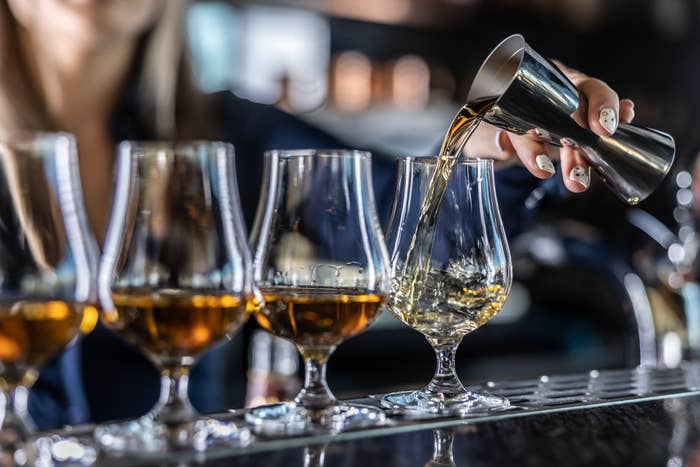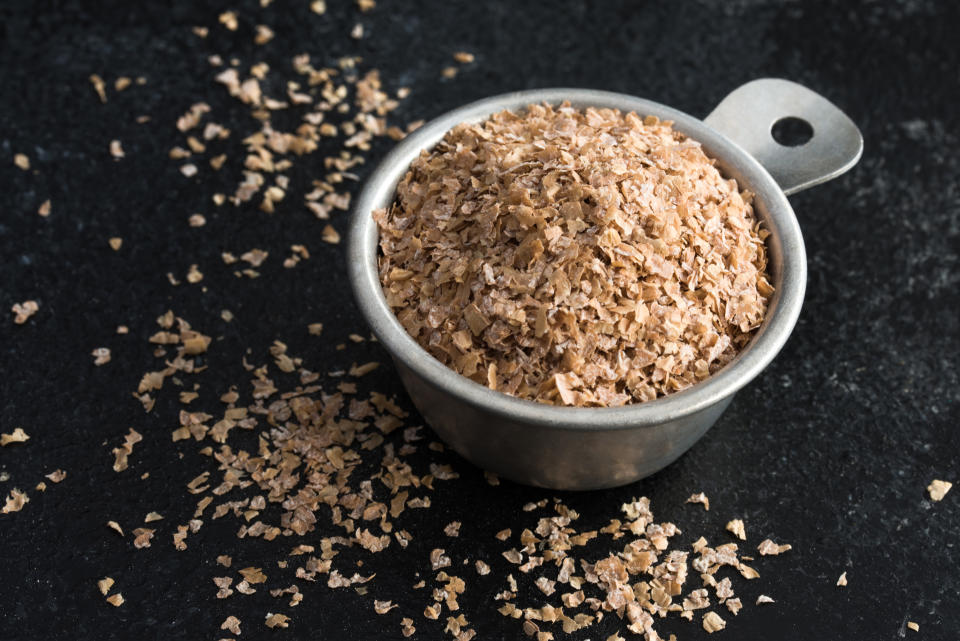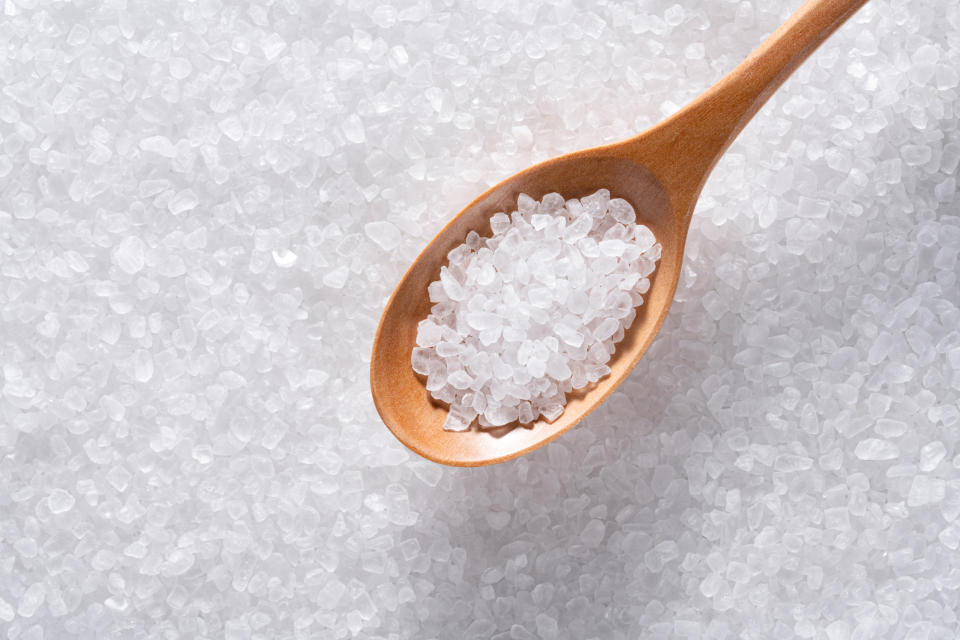"Maintaining Strong Bones Has Less To Do With Drinking Tons Of Milk": Experts Are Sharing What To Foods May Negatively Impact Your Bone Density

My grandmother has osteoporosis, along with 10 million other Americans diagnosed with the disease and 43 million others with low bone mass. Not wanting to follow in her hobbled footsteps, the rest of the women in the family are taking precautions, including consuming the recommended amount of calcium (more isn’t necessarily better), adding weight-bearing exercises to our exercise regimens and attending regular doctor checkups.
But according to orthopedic specialists, protecting and maintaining strong bones has less to do with drinking tons of milk (those Got Milk campaigns certainly had their intended effect) and more to do with avoiding foods and beverages that can impact our bone density.
Folks concerned about osteoporosis often add calcium and vitamin D to their diets, but these supplements could hurt your bone health rather than help if not taken as needed. Dr. Liz Matzkin, associate professor at Brigham and Women’s Hospital in the Department of Orthopedic Surgery in Boston, explained: “Although calcium and Vitamin D is important to maintain bone health, exceeding the recommended doses per day can backfire and be harmful rather than beneficial. Calcium and vitamin D requirements are age dependent, so make sure you are aware of the optimal dose for you.”
She advised that, for ages 50 and over, the recommendations are 1,000 milligrams per day of calcium and 800 to 1000 international units per day of vitamin D.
Below, orthopedic surgeons and specialists share the foods they avoid to help lessen their risk of osteoporosis.
Alcohol

We don’t blame you if you’re totally confused about whether alcohol is a healthy or unhealthy addition to your diet. Whether you’ve heard it’s beneficial for heart health or are concerned about its effect on the liver, Matzkin cautions that sipping a few glasses of pinot or chugging lagers can negatively affect bone health. “An increased consumption of alcohol can alter the body’s ability to absorb important nutrients that are actually beneficial to bone health, such as calcium, vitamin D and magnesium,” she explained.
While calcium and vitamin D often get the spotlight in this area, our sex hormones, like testosterone in men and estrogen in women, are also critical for ensuring strong bones. Angelina Waller, a physician assistant at Advanced Orthopedics in Denver, explained that alcohol “slows the bone remodeling cycle and disrupts hormone levels.”
If you do like to imbibe, Matzkin recommends no more than one alcoholic beverage per day (which is the maximum amount women should be drinking anyway, according to the Centers for Disease Control and Prevention). Older folks and those who are at risk of bone breakage should be especially cautious. “Lastly, if you consume too much alcohol, there is a higher risk of falling and injuring or fracturing a bone,” Matzkin said. A 2018 study found a link between alcohol consumption and hip fractures.
Caffeine

While America runs on coffee, it doesn’t fuel our bones. And not just coffee. Add energy drinks, soda, tea and supplements or any product with caffeine to the hit list.
Just like alcohol, the idea isn’t abstention but moderation. “Caffeine has been shown to increase calcium loss and decrease calcium absorption, both of which negatively influence bone health,” Matzkin said. “Consider decaffeinated coffee or tea options if you just need something to warm you up or, even better, a tall glass of water.”
The Food and Drug Administration recommends no more than 400 milligrams of caffeine a day (about 4-5 cups of coffee), which is a good guideline to use for bone health too.
The bone builder vitamin D is also affected by caffeine, which can interfere with absorption. “Caffeine causes decreased calcium absorption and increased calcium loss in the urine,” Waller said.
Soda, particularly cola, is also a culprit of bad bone health. A 2006 comparative study found that drinking cola (including diet versions!) was associated with significantly lower bone mineral density in women. The level of consumption is related to the problem: The more cola the women drank, the more significant its impact.
“Soda contains sugars and can also contain phosphoric acid and caffeine,” Matzkin said. “All of which fail to have any health benefits and, if consumed in large quantities, will result in negative health consequences.”
Wheat Bran

It may come as a surprise that heart-healthy wheat bran can have a negative effect on bone health.
“Wheat bran has high levels of phytates, which can prevent calcium absorption,” Matzkin explained. Many people eat wheat bran because it’s high in dietary fiber, which is essential for keeping you regular, decreasing heart disease and even preventing colon cancer, all important considerations for many Americans.
Thankfully, if you’re a consumer of oat bran (which is different from wheat bran), it doesn’t have the same deleterious effects on bones as wheat bran, according to Matzkin, as it doesn’t contain high levels of phytates.
Phytates are a type of anti-nutrient naturally found in plants. Many of your favorite veggies and legumes (from kale and cabbage to beans and peanuts) contain compounds that reduce the absorption of other nutrients. Pseudoscience makes a big deal out of avoiding these compounds, but for the most part, there’s no reason to avoid these otherwise-healthy foods.
Beans, spinach and beets also contain anti-nutrients that can decrease calcium absorption, but soaking (in the case of dried beans) or cooking (for raw spinach and beets) lessens their impact, according to Waller. “Beans and wheat bran contain phytates, and spinach and beets contain oxalates that decrease calcium absorption as they bind to the calcium,” she said.
If you want to reduce the phytates in wheat bran, you can try soaking, sprouting or fermenting it. Since it has tons of other benefits, there’s no need to completely remove it from your diet, just moderate your intake.
“As with almost all foods, moderation is key,” Matzkin said. “No need to completely eliminate wheat bran from the diet, but understanding that it can affect [calcium] absorption should prompt supplementation with other [calcium]-rich foods.”
Salt

Whether your tastes run salty or sweet or salty-sweet, the white stuff is typically associated with high blood pressure rather than bone loss. But it really should be a consideration for bone health, especially for older and at-risk groups.
“Be aware of salt that can be hidden in meats, snacks and processed foods such as cold cuts,” Matzkin said. “Consuming excessive amounts of salt (more than 2,300 milligrams per day) can lead to calcium loss from your bones.” According to a 2018 study by the Journal of the American College of Nutrition, increased sodium consumption significantly increased the risk of osteoporosis.
To put that in perspective, 2,300 milligrams per day is equal to 1 teaspoon of table salt, according to the FDA. On average, Americans are eating 1.5 times that amount.
This post originally appeared on HuffPost.

